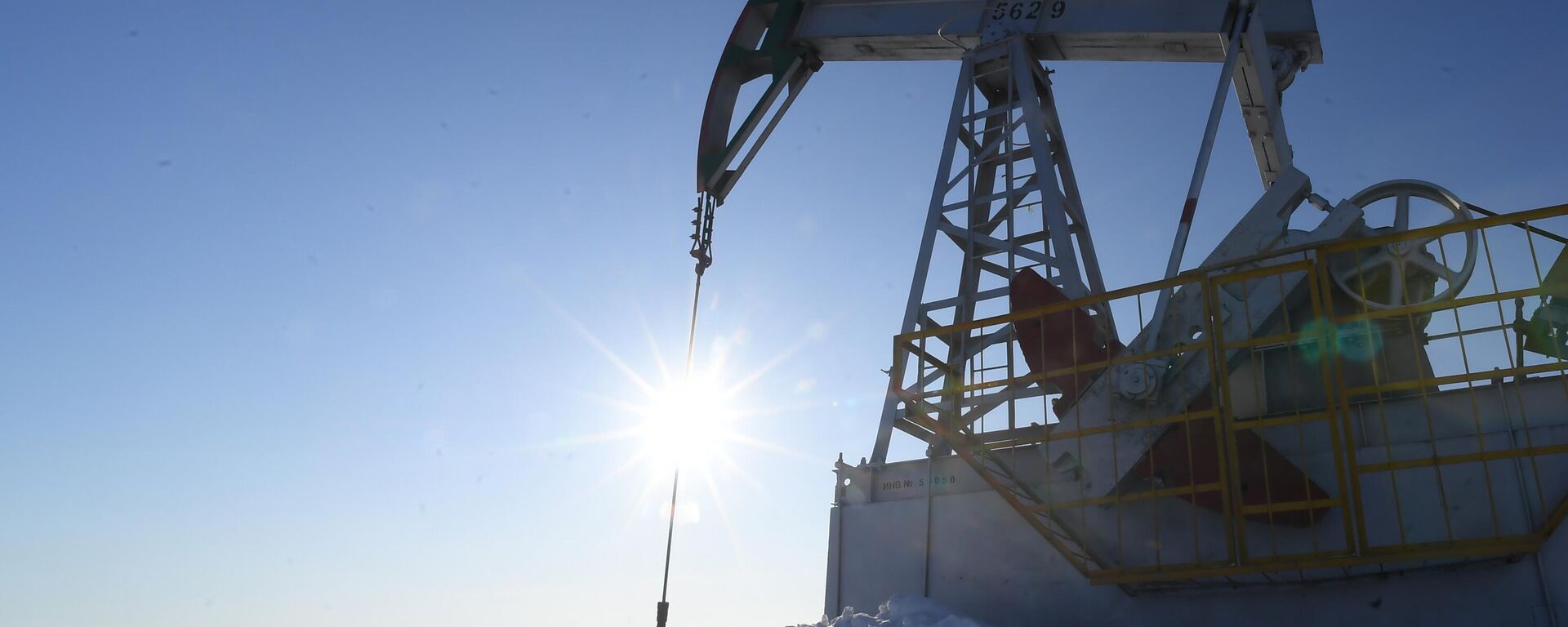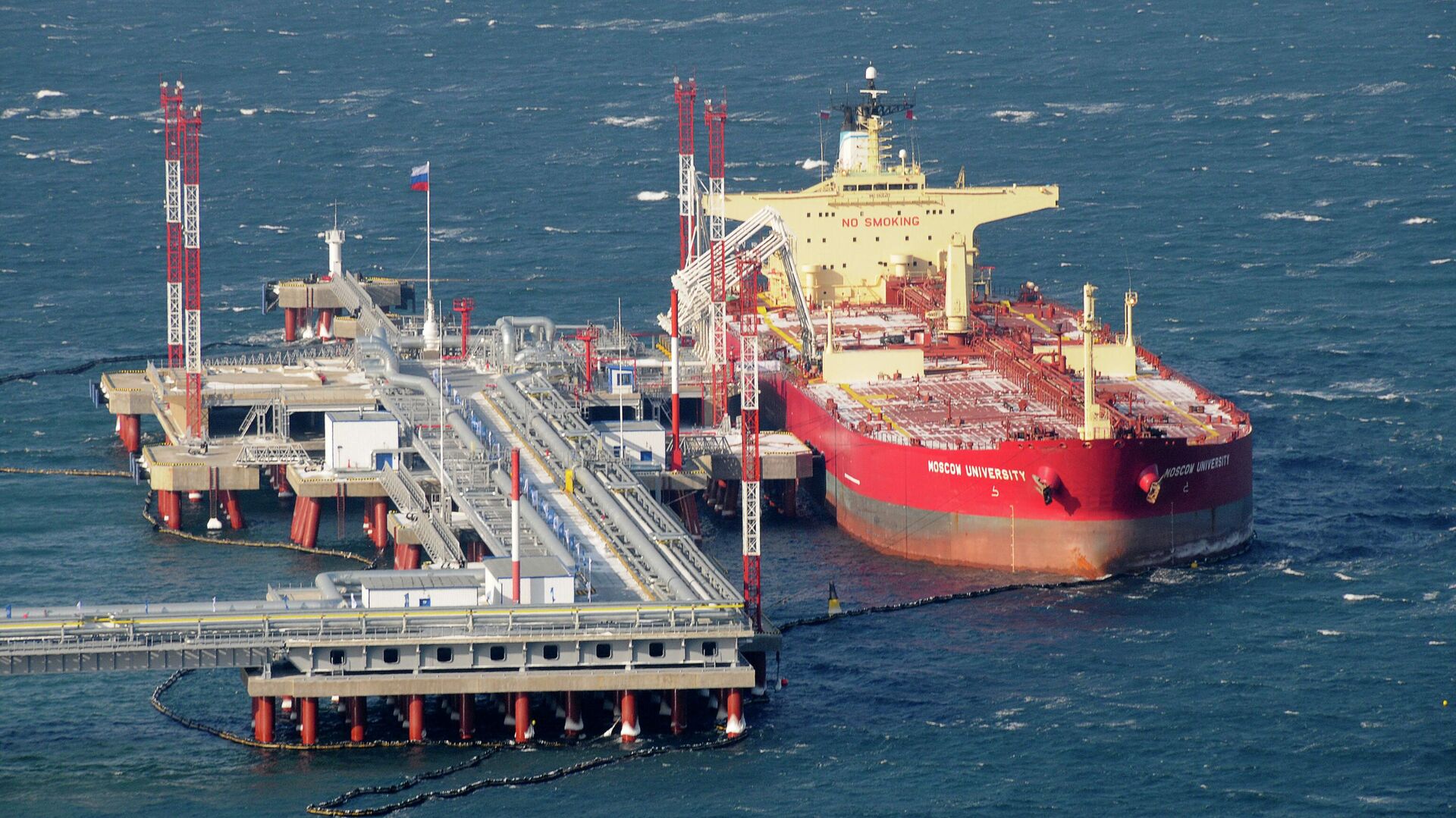https://sputnikglobe.com/20221202/eu-reportedly-wants-member-states-to-impose-60-per-barrel-price-cap-on-russian-oil-1104951477.html
EU Reportedly Wants Member States to Impose $60 Per Barrel Price Cap on Russian Oil
EU Reportedly Wants Member States to Impose $60 Per Barrel Price Cap on Russian Oil
Sputnik International
A new report suggests the European Commission has finally settled on an exact amount for the “price cap” it plans to force on Russian oil exports – but whether... 02.12.2022, Sputnik International
2022-12-02T02:13+0000
2022-12-02T02:13+0000
2022-12-14T11:36+0000
world
european union (eu)
cap
russian oil shipments
us-russia dialogue
india
https://cdn1.img.sputnikglobe.com/img/07e6/07/1b/1097841995_0:276:3083:2010_1920x0_80_0_0_f18d6375a88874bc7cf2fefbb3da4764.jpg
The European Commission is urging EU member states to impose a so-called “price cap” of $60 per barrel on oil imported from Russia, US media reported..EU governments have bickered for months over plans to ban European insurers and brokers from providing service to tankers that are transporting Russian oil which has been sold for a price that Washington and Brussels deem too high. But now it seems increasingly likely that such a measure will be adopted throughout the continent.In recent weeks, it appeared possible that the trans-Atlantic ruling class would prove unable to impose an anti-Russian price limit on Europe at all. But Hungarian opposition to the cap was seemingly circumvented this week with a decision to carve out an exception from the price cap for Budapest, and the only pushback now is coming from Poland, which reportedly opposes the price cap on the grounds that it is too high.Russian Foreign Minister Sergey Lavrov expressed skepticism about the attempted restrictions on Thursday, saying the West will struggle to implement price limits because Russia’s partners will simply ignore them.The foreign minister went on to suggest that such measures are likely to ultimately backfire – and isolate Western nations from the international community, rather than Russia.Prices “should be decided on a mutual basis between producers and consumers, and not someone who just decided to punish someone,” he said. And when they aren’t, it “sends a very powerful long-term signal to all states without exception … to consider abandoning the mechanisms imposed by the West within its globalization systems,” Lavrov explained.Oil currently sells for nearly $90 per barrel on the international market, but due to sanctions and other punitive measures taken by Western governments, oil originating in the Russian Federation has traded at significantly lower levels since military operations in Ukraine began in February.Much of the Russian oil supplies which were previously destined for European capitals have since been rerouted to Asian nations instead. It’s now the number one supplier for nearby India and China, which have taken advantage of steep price discounts over the past nine months and now account for around half of all Russian oil exports.It’s unclear just what impact – if any – the new price cap may have on Russia’s blossoming trade relationships. But in a fiery interview last month, India's Petroleum Minister Hardeep Singh Puri suggested it would be minimal. He responded flatly: “India will buy oil from wherever it has to.”
https://sputnikglobe.com/20221130/eu-most-likely-to-impose-62-per-barrel-price-cap-for-russia-oil-source-says-1104897531.html
Sputnik International
feedback@sputniknews.com
+74956456601
MIA „Rossiya Segodnya“
2022
News
en_EN
Sputnik International
feedback@sputniknews.com
+74956456601
MIA „Rossiya Segodnya“
Sputnik International
feedback@sputniknews.com
+74956456601
MIA „Rossiya Segodnya“
european union (eu), cap, russian oil shipments, us-russia dialogue, india
european union (eu), cap, russian oil shipments, us-russia dialogue, india
EU Reportedly Wants Member States to Impose $60 Per Barrel Price Cap on Russian Oil
02:13 GMT 02.12.2022 (Updated: 11:36 GMT 14.12.2022) A new report suggests the European Commission has finally settled on an exact amount for the “price cap” it plans to force on Russian oil exports – but whether the rest of the world will respect it is anybody’s guess.
The European Commission is urging EU member states to impose a so-called “price cap” of $60 per barrel on
oil imported from Russia, US media reported..
EU governments have bickered for months over plans to ban European insurers and brokers from providing service to tankers that are transporting Russian oil which has been sold for a price that Washington and Brussels deem too high. But now it seems increasingly likely that such a measure will be adopted throughout the continent.
In recent weeks, it appeared possible that the trans-Atlantic ruling class would prove unable to impose an anti-Russian price limit on Europe at all. But Hungarian opposition to the cap was seemingly circumvented this week with a decision to
carve out an exception from the price cap for Budapest, and the only pushback now is coming from Poland, which reportedly opposes the price cap on the grounds that it is too high.
Russian Foreign Minister Sergey Lavrov expressed skepticism about the attempted restrictions on Thursday, saying the West will struggle to implement price limits because Russia’s partners will simply
ignore them.
“We are not interested in what the price cap will be, we will negotiate with our partners directly, and the partners who continue to work with us will not look at these caps and will not give any guarantees to those who illegally introduce them,” Lavrov was quoted as saying.
The foreign minister went on to suggest that such measures are likely to ultimately backfire – and isolate Western nations from the international community, rather than Russia.
Prices “should be decided on a mutual basis between producers and consumers, and not someone who just decided to punish someone,” he said. And when they aren’t, it “sends a very powerful long-term signal to all states without exception … to consider abandoning the mechanisms imposed by the West within its globalization systems,” Lavrov explained.

30 November 2022, 13:35 GMT
Oil currently sells for nearly $90 per barrel on the international market, but due to sanctions and other punitive measures taken by Western governments, oil originating in the Russian Federation has traded at significantly lower levels since military operations in Ukraine began in February.
Much of the Russian oil supplies which were previously destined for European capitals have since been rerouted to Asian nations instead. It’s now the number one supplier for nearby India and China, which have taken advantage of steep price discounts over the past nine months and now account for around half of all Russian oil exports.
It’s unclear just what impact – if any – the new price cap may have on Russia’s blossoming trade relationships. But in a
fiery interview last month, India's Petroleum Minister Hardeep Singh Puri suggested it would be minimal. He responded flatly: “India will buy oil from wherever it has to.”



